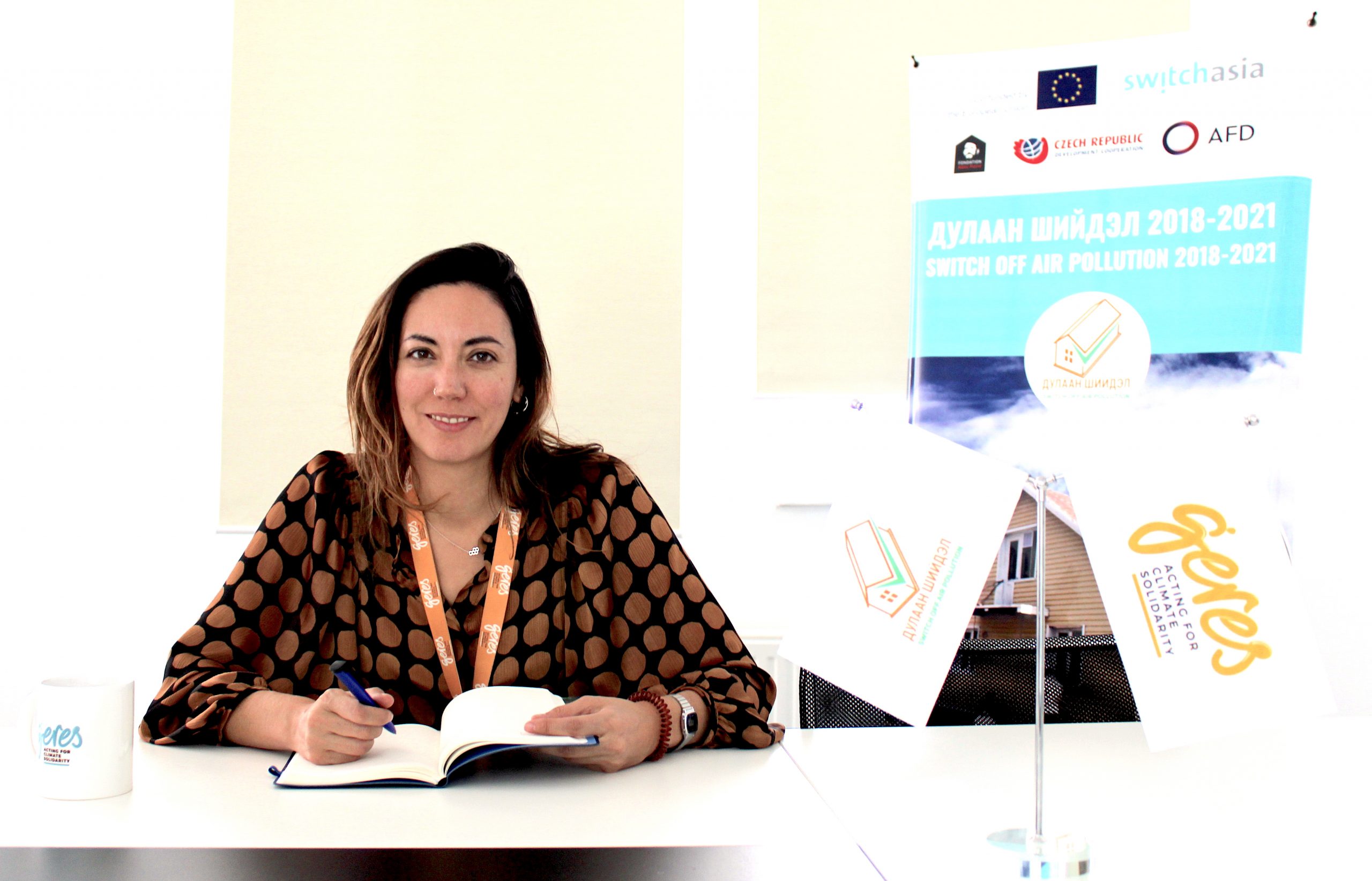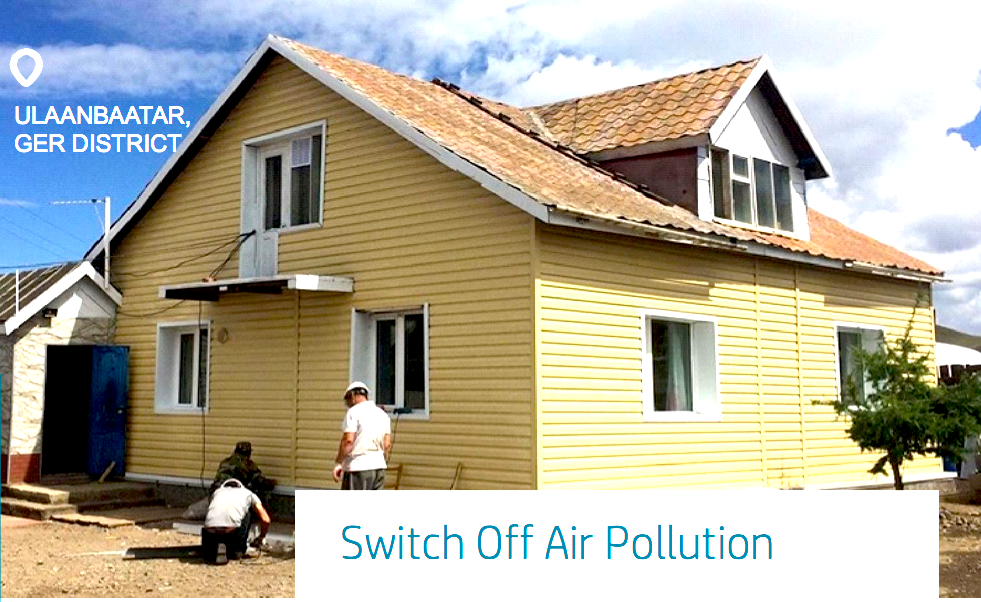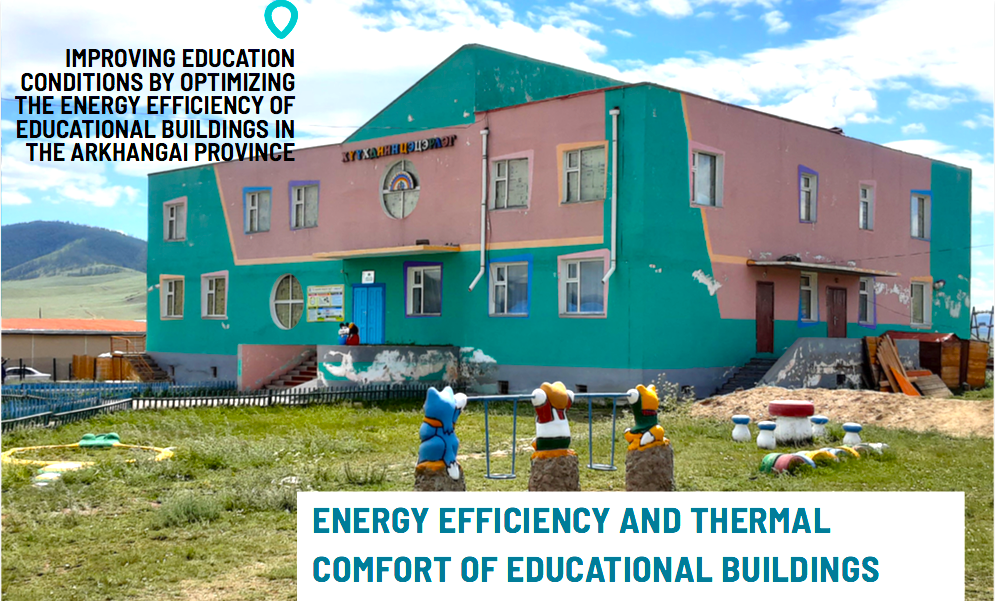Beatriz Maroto Izquierdo: We are here to enhance the living conditions of Mongolian citizens, especially the most vulnerable population

Mongolian Economy magazine spoke with Beatriz Maroto Izquierdo, Country Director of Geres Mongolia, about the Switch off Air Pollution Project, benefits of insulating private houses in the ger area and other on-going projects in Arkhangai and Khentii provinces.
-How many people are working at Geres Mongolian Office? Could you tell us about the on-going projects?
-At Geres Mongolia, we have 14 staff members. At this moment, we have three on-going projects. The first one is called the “Switch off Air Pollution (SOAP)” Project to improve the insulation market in the ger areas in Ulaanbaatar. The SOAP project is a four-year project that started in 2018 and being implemented by Geres Mongolia in cooperation with the Building Energy Efficiency Center, Mongolian National Construction Association and People In Need INGO with the financial support of the European Union, Abbe Pierre Foundation, Czech Development Agency and the French Development Agency. This project is supposed to end this year but due to COVID-19, we have requested additional four months for the implementation.
The second project is called IMPACT, which is an agriculture project for organic farming implemented with AVFS and Mongolian Women’s Fund in Arkhangai and Khentii Provinces. The third project is the “Energy Efficiency and Thermal Comfort of Educational Buildings” in Arkhangai Province. Under this project, we are going to insulate two kindergartens demonstrating the feasibility and relevance of improving energy efficiency in public buildings in Arkhangai Province. In addition to that, we support and provide training for building professionals. The latter two projects will be completed by the end of 2022.
-What are the projects that will be implemented after 2022 when all the ongoing projects are completed?
-We plan to launch the second phase of the SOAP Project. Geres Mongolia has already submitted the proposal for the second phase of the SOAP Project and is waiting for approval. Also, Geres Mongolia has discussed the possibility of continuing the cooperation with the Ministry of Construction and Urban Development.
For the SOAP Project, we believe that four years is not enough to perfect a market for insulation. Furthermore, we want to expand the SOAP and Energy Efficiency and Thermal Comfort of Educational Buildings projects to other provinces in Mongolia.
-Currently, you have projects in Ulaanbaatar, Arkhangai and Khentii Provinces? Why did you decide to carry out projects in Arkhangai and Khentii Provinces?
-Our partner organization AVFS was working in Arkhangai Province. The AVSF has been working with Mongolian livestock farmers since 2004 and created livestock farmer federations with more than 850 livestock farmers in Arkhangai Province. Thus, we decided to work with AVFS in the agricultural sector in Arkhangai Province. Our main focus was organic farming whereas AVFS was more focused on livestock farmers and livestock-farming products such as milk, meat and fiber. In the case of Khentii, they already had professional farmers in the agricultural sector but did not have a farmers network. Therefore, with Caritas Czech Republic Mongolia, we started working to strengthen the farming sector in Khentii Province. When we started our agriculture project at these two provinces, they were unable to meet local demands for vegetables so they had to import food from China or Russia. Our goal was to help these provinces at least meet their local demands and have food security. Geres and our partnering organizations introduced greenhouses and cellars which helped farmers to extend the growing season and improve storage. Previously, production was impossible due to intense cold. So far, Geres has already instigated the construction of 243 passive solar greenhouses and 74 eco cellars.
Another reason for working in provinces was that we wanted to improve the living conditions of provinces to reduce migration to Ulaanbaatar. Most of the migrants live in the ger area which is becoming the main source of air pollution. Even though Geres carried out agriculture projects such as constructing passive solar greenhouses and bioclimatic cellars, the organization is shifting its focus to the energy sector worldwide. That means Geres will be more focused on the energy efficiency of houses and buildings in Mongolia and our agricultural projects in Khentii and Arkhangai will be our last project on farming.

-At the moment, the Switch off the Air Pollution Project is implemented in ger areas. Why Geres is not implementing this project in all areas of Ulaanbaatar?
-Geres is an NGO that aims to help the most vulnerable households. That is why our project is being implemented in the ger area. On top of that, the ger area is one of the sources of air pollution in Ulaanbaatar which needs to be addressed. Over-reliance on coal for heating and cooking purposes is a key factor to GHG emissions and strongly contributes to air pollution. It also causes health problems that disproportionately affect children, pregnant and the elderly. The CO2 emissions in Ulaanbaatar’s ger areas can be reduced through improved energy efficiency in housing, awareness-raising, technical training and technical support to SMEs and households.
Furthermore, during the project in energy efficiency in Arkhangai Province, we discovered that both public and private buildings are not in compliance with the building code and insulation standards of Mongolia. Therefore, kindergartens that were built only four years ago have cracks or even have molds in the walls. Geres is planning to identify the gap and the main reasons for failing to follow building codes in provinces. Moreover, Deutsche Gesellschaft für Internationale Zusammmenarbeit (GIZ) developed the local energy efficiency action plan for buildings in Ulaanbaatar. With the GIZ we plan to support the development of a local energy efficiency action plan of Arkhangai Province. We hope to reduce the consumption of coal, save energy expenditure and improve the living conditions in Arkhangai Province.
-Under the Switch off the Air Pollution Project, you are insulating houses. Can it be used to insulate the gers?
-Our project targets private houses, not gers. There are two reasons. The first reason is around 60 percent of dwellers in the ger area live in private houses and also people living ger tend to move to a house. The second reason is the UNICEF was already working on the insulation of gers. We do not want our projects to overlap with projects instead we want to fill the gap.
-Without the insulation how much heat does a house lose? What options households have if they do not have the necessary financial sources to insulate their houses?
-Basically, the insulation helps to keep the house warm. Depending on the type of insulation you choose to install, you can save up to 70 percent of your energy. You can insulate your roofs, walls and the foundation of your house. However, very few houses in the ger area have a foundation.
By installing roof insulation with 5 cm thickness you can save 12 percent of your energy, with 15 cm you can save 25 percent and with 30 cm you can save up to 35 percent.
We put the emphasis on installing insulation on the roof because the house loses most of its energy through its roofs as warm air goes up. According to our survey, the households that installed insulation feel more comfortable and warm during the winter. We also found that the households were able to save money with the help of insulation as they started buying less coal. It is encouraging for us to hear that some households have already started recommending insulation to neighboring households. Continuous study on the insulation market is being conducted to understand the needs of the customers better.
For the majority of people living in the ger area, it might seem expensive to insulate their house. However, they have the option of insulating only walls or roofs and even can choose the thickness and material of insulation. In other words, you can insulate your house step by step according to your financial capacity.
We will keep working on offering more options that could be more affordable. Under the Eco Consumption Loan offered by Xac Bank, only full package and roof insulation with a thickness of 20 cm are offered. As the loan is subsidized by the Government of Mongolia the annual interest rate is eight percent. In the near future, there will be more banks that offer loans for insulation. Unfortunately, not all households in the ger area meet the requirements for the loan. Hence, we might consider non-banking financial institutions for giving loans on insulation. We truly want to enable more households to receive financial support.
The majority of households in the ger area do not plan or afford to move to apartments and households living in ger tend to move to a house or build a house. That is why I think insulation is the best available and affordable choice for households living in the ger area. Moreover, unless you reduce the heat loss it is not as effective if it could be to change your stove or the type of coal you are using.

-How many houses have installed the insulation offered under the Switch Off the Air Pollution Program?
-Until now 48 houses have been insulated and at the moment five or six more houses are getting insulated. The majority of people living in the ger area are not aware of the cost and social advantages of insulation. That means there is not much demand for insulation. Therefore, we will keep putting efforts into raising awareness.
-How do you work in terms of raising awareness? Do you plan to organize offline events in the near future?
-Due to COVID-19, we mostly use online channels to raise awareness. For example, we provide information and share short videos about insulation in ger areas through two Facebook groups called Dulaan Shiidel Tusul and Dulaalgin Khyalbar Shiidel Ayan. Geres and our partners plan to hold a live session on Facebook for raising awareness about a step-by-step approach starting from low-cost solutions to full package insulation. In the near future, we want to visit the ger area with our partnering organizations. It is important that we raise awareness to involve more households in the SOAP Project and contribute to reducing air pollution and mitigating climate change.
-Do you plan to expand your cooperation on the Switch Off Air Pollution Project with other international organizations such as the United Nations or JICA? How do you collaborate with the Government of Mongolia?
-At the moment, we are planning to work with Mongolian Green Finance Corporation and also with the working group of the Ministry of Construction and Urban Development. Geres Mongolia always exchanges information and has discussions about the current issues with other organizations and stakeholders. We also try to create synergy with the Government of Mongolia’s air pollution projects.
In fact, we are currently discussing the government subsidies to a green loan with the Ministry of Construction and Urban Development.
As more and more households will be needed to make more impact, the government subsidy is critical in reaching the most vulnerable households. Yet, we do not want the subsidies to destroy the market.
-How can we ensure that the subsidies would not destroy the market?
-I do not have a specific answer yet. It is currently being discussed as I mentioned before. I assume the subsidy can be used to decrease the interest rates of loans and give discounts on insulation.
-You have insulated kindergartens in Arkhangai Province. Would you consider insulating public schools in Ulaanbaatar?
-Currently, there are other actors who work in the insulation of public schools in Ulaanbaatar. One of the examples is UNICEF. We might insulate schools in other regions but not going to insulate the whole school. We do not want to duplicate the projects implemented by other actors but fill the gaps.
There are provinces that cannot insulate all schools but they could start from the roof, ventilation or improve the structure of the building. We have conducted a survey to identify problems faced by provinces. According to the gap report, we plan to provide training with GIZ and determine the energy efficiency action plan in the provinces. The gap report will be available online in Mongolian and English languages via Geres’ websites.

-What are the other studies conducted by Geres Mongolia?
-Baseline study was conducted to understand people’s knowledge and attitude on heat loss, air pollution, households’ saving and spending patterns, future investment plans for houses. Construction typologies patterns and brigades and individuals working in the construction sector. It was the very first study in Mongolia.
-What obstacles do you face in implementing projects in Mongolia?
-For the SOAP project, the market was small and demand was low. Furthermore, it is hard to reach many people at once as Mongolia lacks large community networks. Compared to other countries, there are hardly any community networks for specific interests in Mongolia. Thus, it was challenging to teach people in different ways.
-What can individuals do to mitigate climate change?
-It is everyone’s responsibility to fight against climate change. Shifting to more energy-efficient products. We can reduce our energy consumption and move to renewable energy. You could turn off the TV if you are not watching, the light if you are not in the room, limiting the air conditioning to 20 degrees (if you can adjust). In the ger area, the households are quite efficient and smart about the energy consumption.
-What is unique about Mongolia?
-It is a unique country in the sense that it the latest nomadic country, very adaptable to any changes including technological changes and has a self-sufficient tradition that elevates self-esteem.
-What would you want our readers to know about Geres Mongolia? What is your message to youth in Mongolia?
-I would like to say that our team at Geres is here to enhance the living conditions of Mongolians, especially the most vulnerable population.
I want to say to the youth that they have great potential. Each of you can improve your living conditions and contribute to the development of your country.
